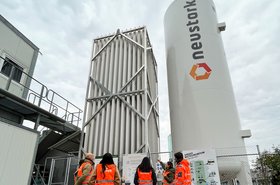The cloud is one of the big innovations of the 21st century and, with 56 percent of companies claiming their business operates on a cloud-first or cloud-only model, business leaders can be forgiven for assuming on-premises servers are dead and buried. However, there is still very much a place in the modern business for using dedicated servers. Every organization has different needs and a cloud-only approach may not be suitable for all business models. In some circumstances, servers can be used in practically the same way as the cloud and have a lower total cost of ownership. So they offer a real alternative to ‘classic’ cloud services and can often form a vital component of hybrid IT designs.
The advantages of the public cloud and hyperscalers are well documented - notably, reduced downtime losses, speed and scalability. But, on the opposite end of the ‘cloud spectrum,' dedicated servers get far less share of voice. Seen more as the ‘old man’ of the IT field, there’s rarely a song and dance about the benefits of having a specialized server. But they do play an important role in the cloud, especially for plannable workloads. This is because they offer companies a unique combination of performance, security and control compared to other infrastructures. A major advantage is that dedicated servers, as a single-tenant option, do not need to be shared. In addition, there are numerous other factors that speak for the use of dedicated servers.
A key challenge facing data center professionals is how to balance the right range of infrastructure choices located in one - or many - data centers. Businesses want more choice and flexibility than ever before so it is vital for data center professionals to be part of the decision and design process. For dedicated servers, here are three of the most important benefits to consider…
Keeping IT simple
‘Keeping it simple’ is an important mantra for any IT team. Cloud operations can be very complex in practice and, without active management, can result in additional technical support costs. With dedicated hosting, on the other hand, there is no need to worry about the complexity of the solution. For companies that have neither the right staff nor the expertise within the company to run the cloud professionally, dedicated servers are a good alternative. Software solutions that are already in use can be taken with them so that the IT team does not have to get used to the new environment.
Additionally, anyone looking to set up their first hosted infrastructure with dedicated servers doesn't have to start from scratch. After all, there are many tools on the market that can make it easier to get started, to provision and manage hardware as easily as VMs.
Reducing ownership costs
Unlike on-premises servers, which require a large initial investment in addition to regular support and maintenance, dedicated server solutions are billed on a monthly basis. This makes dedicated hosting much more budget-friendly than running hardware in-house.
Cloud hosting usually offers a cost advantage at the lower end of the spectrum. However, costs go up the more you scale up and the more resources you need. Dedicated servers, on the other hand, usually come with a higher entry cost, but offer more reliable and cost-effective scaling as a business or its traffic grows.
When deciding on a hosting solution, organizations should consider both future and current growth in terms of total cost of ownership (TCO). It is not uncommon for running an infrastructure via a cloud service to be many times more expensive than via dedicated servers.
The difference often comes down to predictability. With dedicated hosting, the monthly bills are clear from the outset. With cloud hosting, there can be some surprises at the end of the month when you look at the bill - for example, in terms of network usage or computing power. Dedicated servers offer a way out of the cloud to regain independence.
Operating dedicated like a cloud
The cloud is known for its ease of configuration and flexibility. But dedicated servers can also be run in the same way using cloud-like automation. Moreover, the time spent on manual configuration of server hardware can be minimized by using automation. Automation also helps to redistribute available resources to where they are most effective. For example, additional machines can be made available as needed, completely without human intervention. In this way, desired performance levels can be guaranteed at all times.
Dedicated servers thus offer the best of both worlds for many business uses: you get the performance and security of dedicated hosting with the flexibility and responsiveness of the cloud. You retain full control and are completely independent from cloud providers.
Dedicated servers offer full control and independence
The most important aspect of choosing the right infrastructure is to match it in detail to the exact requirements of the business. There are use cases where the flexible public cloud offerings of hyperscalers can make sense. However, you pay a premium for this flexibility. At the same time, there are numerous scenarios that may benefit from dedicated servers. Dedicated servers offer full control over the infrastructure without vendor lock-in. This applies not only to administration - the hardware can also be optimally configured according to need. Racks can be individually configured, including physical network components. In many cases, no compromises in functionality are necessary. With the right tools, dedicated servers can be operated like a genuine cloud environment.
The advantages of dedicated servers are performance, security and control, simplicity and the often more favorable total cost of ownership. For many businesses, whether they need to run a busy website, store and process large amounts of data, or support mission-critical applications, dedicated servers can be the better solution.





